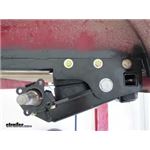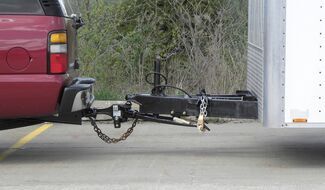
Disc Trailer Brakes are Weak on One Side After Replacing Calipers and Pads and Bleeding Brakes
Question:
Hello. I have a 2006 Load Rite tandem axle trailer. Disc Brakes on the first axle only. I have new calibers, new pads, and a new actuator. I have bled the breaks several times and see no air. I lift the one side, actuate the brakes the wheel stops spinning... BUT - I can turn the week with some force. I have the trailer inspected and the inspector says the weeks must lock up. Now the last time I took it, I must have had air in the lines, because the week would just slow down, it didnt lock upi when the brakes were applied. Now, the wheel spinning and the brakes hit, the week abruptly stops - but as said - I can turn it with some muscle. So my question, is should it lock up completely and not be able to be turned? I dont want to go back for my re-inspection if this is the case since he said lock up. Thoughts? I would think that it shouldnt completely lock up when stopping with my boat, since the wheels would skid every time I stop? It is definitely working by slowing down just not a complete lock up.
asked by: Eric
Expert Reply:
Like you said, you don't want the trailer wheels to lock up all the time. They should stop the wheels proportionally to how much force is exerted on the actuator. With that said it could be that you are not physically pushing in the actuator all the way to reach lock up.
There could also be a leak somewhere but I think you would notice fluid dripping out. Sometimes the brake lines are not large enough depending on how far the actuator is from the calipers. A larger diameter brake line might help.
You will also want to check the fittings for any foreign objects that could be limiting fluid flow to the calipers.
With the brakes fully applied you should not be able to turn the wheel by hand so it does sound like something is a little weak on that one side. It is also possible that after replacing the brakes they need a little time to set properly; clear the gap, if any, between the pads and the rotors.

Product Page this Question was Asked From
Demco Hydraulic Drum Brake Assembly - Single Servo - Galvanized - 10" - Right Hand - 3,500 lbs
- Accessories and Parts
- Trailer Brakes
- Hydraulic Drum Brakes
- RH
- 3500 lbs
- Brake Assembly
- Single Servo
- 10 x 2-1/4 Inch Drum
- Demco
more information >

Continue Researching
- Search Results: coupler with inner tube only
- Search Results: kodiak disc brake conversion kit
- Search Results: safety chain loops
- Search Results: safty chains
- Search Results: coupler only
- Video: Demco Brake Actuator - Surge Brake Actuator - DM8164311 Review
- Video: Review of Demco Straight Tongue Trailer Coupler - Standard Coupler - DM15931-52
- Shop: Dexter Brake Actuator w/ Drop - Painted - Drum - 2-5/16" Ball - Weld On - 12,500 lbs
- Shop: Demco Channel Tongue Trailer Coupler - eZ-Latch - Silver - 2" Ball - Bolt On - 10,000 lbs
- Shop: Demco Hydraulic Brake Actuator w Drop and Electric Lockout - Disc - Zinc - 2-5/16" Ball - 16K
- Shop: Demco Channel Tongue Trailer Coupler - Silver - 2-5/16" Ball - 3" Channel - Bolt On - 21K
- Shop: etrailer Trailer Hitch Receiver - Custom Fit - Matte Black Finish - Class III - 2"
- Shop: Demco Channel Tongue Trailer Coupler - eZ-Latch - Zinc - 2" Ball - Bolt On - 7,000 lbs
- Shop: Demco Hydraulic Brake Actuator - Drum - Zinc - 2" Ball - 8,000 lbs
- Shop: Trailer Hitch
- Q&A: How to Know When a Trailer Coupler Shock is Bad
- Q&A: Where to Attach the Safety Chains After Installing the Fulton Fold-Away Coupler Hinge Kit
- Q&A: Recommended Solution to Bolt on Safety Chains to Utility Trailer
- Q&A: Trailer Surge Coupler Can be Pushed in By Hand and Brakes are Weak
- Q&A: Troubleshooting HydraStar Actuator Not Releasing Pressure
- Q&A: Compatibility of Trailer Brake Controller with HydraStar EOH Brake Actuator
- Search Results: class iv safety chains
- Video: Buyers Products Class 4 Trailer Safety Chain with 1 Clevis Hook Review 337BSC3835
- Video: Titan Chain 42" Long Safety Chain with 5/16" Clevis Grab Hook Review
- Video: Titan Chain Safety Chains and Cables - Safety Chains - TCTSCG70-842-06X1 Review
- Q&A: Recommended Safety Chains and Bolt Size Needed To Attach To Demco Coupler # DM16680-52
- Shop: Trailer Wiring
- Article: How to Choose the Right Trailer Hitch Class
- Search Results: trailer hitch
- Video: Choosing the Right Trailer Wiring





























